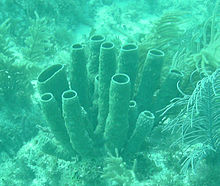Agelas conifera, also known as the brown tube sponge, is a species of sponge. Its color is brown, tan, or greyish brown with a lighter interior. It is common in the Caribbean and Bahamas, and occasional in Florida.[1] Agelas conifera contains bromopyrrole alkaloids, notably sceptrin and oroidin, and levels of these feeding-deterrents increase upon predation.[2] Agelas conifera exhibit a wound response, increasing the production and release of bromopyrrole alkaloids, which appear to also protect against harmful microorganisms. [3]
| Agelas conifera | |
|---|---|

| |
| Scientific classification | |
| Domain: | Eukaryota |
| Kingdom: | Animalia |
| Phylum: | Porifera |
| Class: | Demospongiae |
| Order: | Agelasida |
| Family: | Agelasidae |
| Genus: | Agelas |
| Species: | A. conifera
|
| Binomial name | |
| Agelas conifera (Schmidt, 1870)
| |
| Synonyms | |
| |
Related species
editReferences
edit- ^ Humann, Paul, Reef creature Identification, Edited by Ned Deloach. New World Publications, Inc., 1992, p. 22-23.
- ^ Sven Rohde; Samuel Nietzer; Peter J. Schupp (2015). "Prevalence and Mechanisms of Dynamic Chemical Defenses in Tropical Sponges". PLOS ONE. 10 (7): e0132236. Bibcode:2015PLoSO..1032236R. doi:10.1371/journal.pone.0132236. PMC 4496075. PMID 26154741.
- ^ Richelle-Maurer, E., De Kluijver, M. J., Feio, S., Gaudêncio, S., Gaspar, H., Gomez, R., Tavares, R., Van de Vyver, G., & Van Soest, R. W. M. (2003). Localization and ecological significance of Oroidin and Sceptrin in the caribbean sponge agelas conifera. Biochemical Systematics and Ecology, 31(10), 1073–1091. https://doi.org/10.1016/s0305-1978(03)00072-3